Archived Water Damage Blog Posts
SERVPRO Team Majeski: Experts in Water Damage Restoration
12/15/2024 (Permalink)
When water damage strikes—whether it's a small leak or a massive flood—time is of the essence. SERVPRO® Team Majeski is here to handle it all, from minor residential damages to large commercial disasters. Our trained professionals bring the expertise, tools, and determination to restore your property to its original state, making it “Like it never even happened.”
In our latest commercial restoration project, our crew took on a large-loss water damage job, performing flood cuts and flooring removal with precision and care. These steps are critical for removing water-damaged materials and preventing long-term issues like mold growth.
With advanced equipment and techniques, we ensure your property is thoroughly dried and restored, minimizing downtime and disruption. From homes to businesses, our team is ready 24/7 to respond and make things right.
Need expert water damage restoration? Call SERVPRO Team Majeski today!
Safeguarding Unaffected Areas
9/3/2024 (Permalink)
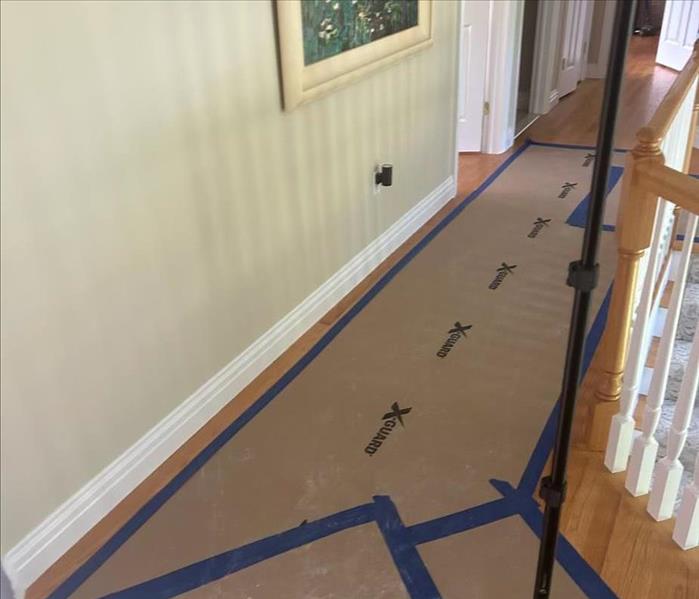 hallway wood floor protected with blue tape and plastic
hallway wood floor protected with blue tape and plastic
When water damage impacts your home, protecting the unaffected areas is just as important as addressing the damage itself. At SERVPRO Team Majeski, we take every precaution to safeguard the rest of your property, ensuring that damage is contained and your home stays safe. Our team is equipped with the expertise and technology to mitigate further harm and restore your peace of mind.
Don't let water damage spread—contact SERVPRO Team Majeski today at 732-578-9888. We're Here to Help® you protect your home and restore it "Like it never even happened."
Thawing the Freeze: A Guide to Preventing and Dealing with Frozen Pipes
12/14/2023 (Permalink)
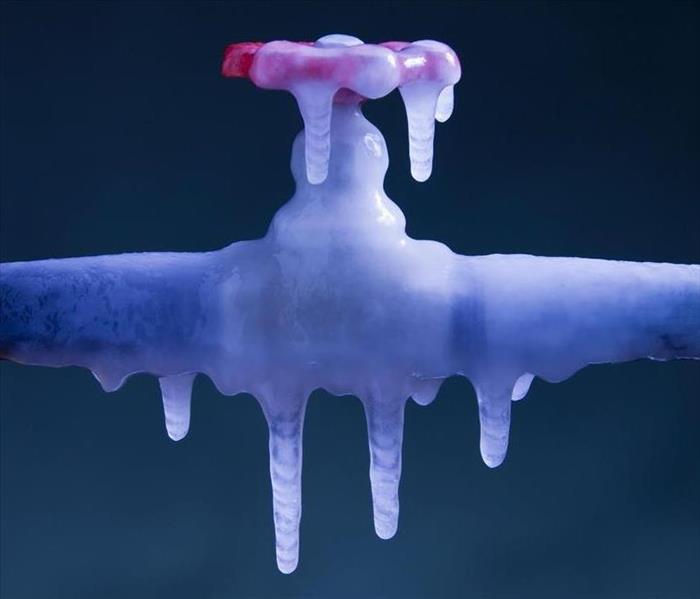 a frozen outdoor pipe faucet that has a leak
a frozen outdoor pipe faucet that has a leak
Thawing the Freeze: A Guide to Preventing and Dealing with Frozen Pipes
Meet the winter challenge head-on by safeguarding your property against frozen pipes and the potential damage they bring. As temperatures plummet, homes and businesses face the risk of leaks, flooding, and even mold. To ensure your water pipes stay functional and your property remains safe, here's a comprehensive guide:
Frozen Pipes: What You Should Know
Understanding the causes is the first step in prevention. Sudden temperature drops, poor insulation, and low thermostat settings contribute to frozen pipes. The vulnerability increases in pipes running alongside exterior walls, exposed to the elements, and those in unheated spaces.
Tips to Prevent Pipes from Freezing
- Disconnect outside garden hoses and secure outdoor valves.
- Ensure your basement is heated, cover crawl space air vents, and close windows near water pipes.
- Let faucets drip slightly overnight, especially those on outside walls.
- Insulate exposed pipes and use heating tape or pipe insulation.
- Keep cabinets open to let heat reach plumbing, and install weather sealing around windows.
- Regularly check and insulate pipes in unheated areas, like garages.
- Never use antifreeze unless directed, as it can be hazardous.
Can You Thaw Frozen Pipes?
Discovering frozen pipes doesn't have to be a nightmare. Follow these steps:
- Shut off the water supply via the main valve.
- Open a faucet to encourage thawing, and apply heat using an electric heating pad, space heater, or hot towels.
- Never use open flames or kerosene for thawing.
- If in doubt or unable to thaw, call a licensed plumber.
Winter Vacation Tip: Check Your Pipes Before Heading Out
If you're escaping the cold for warmer climes, protect your home:
- Shut off water supply and consider draining the system.
- Keep the thermostat no lower than 55º Fahrenheit (12º Celsius).
- Ask a friend or neighbor to check your house regularly.
SERVPRO’s Water Damage Cleanup Process
Should water damage occur, SERVPRO®
Team Majeski is here to help with our eight-step restoration process:
- Emergency Contact
- Inspection and Water Damage Assessment
- Water Removal
- Damaged Material Removal
- Cleaning, Sanitizing, and Deodorization
- Drying
- Monitoring
- Repairs and Construction
NJ Hurricane Season: Are You Prepared for Water Damage?
9/7/2023 (Permalink)
 waves forming in blue ocean as a result of hurricane
waves forming in blue ocean as a result of hurricane
New Jersey's hurricane season typically spans from June through November, with the highest likelihood of storms occurring between August and October. While the Garden State might not be as hurricane-prone as some other coastal regions, it's essential for residents to be prepared. One of the significant risks associated with hurricanes and tropical storms is water damage to homes and businesses.
Water damage in the home often starts as a small issue that worsens over time. Problems like a leaky pipe, roof damage, or condensation may lead to extensive damage if not detected or addressed promptly. However, during hurricane season, the risks escalate, and the damage can be severe.
Here's what you need to know about preparing for water damage during NJ's hurricane season:
1. Inspect Your Property: Before hurricane season kicks into high gear, take time to inspect your property. Look for any existing issues like leaks, cracks, or damaged roofing that could be exacerbated during a storm.
2. Secure Outdoor Items: High winds can turn outdoor items into projectiles. Secure or store outdoor furniture, grills, and other loose items to prevent damage to your property or neighboring ones.
3. Check Drainage Systems: Ensure that your property's drainage systems, such as gutters and downspouts, are clear of debris and in good working order. Proper drainage can prevent water from pooling near your home's foundation.
4. Create an Emergency Kit: Assemble an emergency kit that includes essential items like bottled water, non-perishable food, flashlights, batteries, a first-aid kit, and important documents. Don't forget to include any necessary medications.
5. Develop an Evacuation Plan: Familiarize yourself with your community's evacuation routes and shelters. Have a plan in place for your family, including pets, in case you need to evacuate.
6. Consider Flood Insurance: Standard homeowners' insurance policies often don't cover flood damage. If you live in an area prone to flooding, consider purchasing flood insurance to protect your home and belongings.
7. Stay Informed: Monitor weather forecasts and stay informed about approaching storms. Sign up for emergency alerts and have a battery-powered weather radio on hand.
8. Trim Trees and Branches: Overhanging branches or weak trees can become hazards during strong winds. Trim trees and branches that could potentially damage your home or power lines.
Despite all precautions, water damage can still occur during a hurricane. If your home experiences water damage, it's crucial to act quickly to minimize further harm. Our team is available 24/7 to respond promptly and mitigate the damage, helping you get your life back to normal as soon as possible.
Don't wait until the next storm hits. Be proactive and prepared to protect your home and loved ones during New Jersey's hurricane season.
Flood Damaged Floor Repair
9/30/2022 (Permalink)
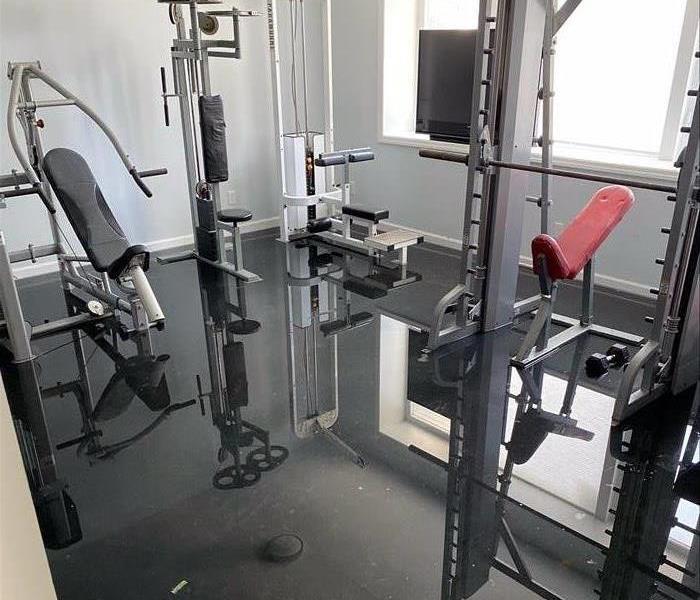 An NJ home gym was flooded but remediated by SERVPRO.
An NJ home gym was flooded but remediated by SERVPRO.
Storm surges can be dramatic and cause significant damage but with the proper tools and training, it doesn’t have to mean a total renovation. The only good thing about storm surges is that the waters often recede as quickly as they rush in. Hardwood flooring that is properly protected with polyurethane can withstand water penetration if remediation happens quickly. At SERVPRO we have the right equipment and training to often save hardwood floors instead of removing them. Here are three techniques we use.
First, our injecti-dry panel system is one way to extract moisture. Our technicians use plastic sheeting to create a containment area and install dehumidifiers to regulate the moisture levels. The panels are installed with special methods to reduce additional damage. We then use moisture measuring meters to monitor the changing moisture levels all the way to the subfloor.
Second, we may utilize a heat drying system that heats the material to approximately 100 degrees. Heat ducts are installed to remove the humid air and infrared monitors are used to monitor the drying process.
Finally, a Desiccant Dehumidifier may be used to introduce outside air which is passed through a dehumidifier before being introduced to the material. Again, moisture monitoring equipment is used to measure the progress and reduce moisture at a controlled rate.
If you experience flooded floors call us to see if one of our methods can be used to save the material before you begin removing any material.
Drying hard wood floors
5/27/2022 (Permalink)
 Water from the bathroom damaged this bedroom floor which was dried and repaired rather than replaced.
Water from the bathroom damaged this bedroom floor which was dried and repaired rather than replaced.
Water damage to hardwood floors can be tricky. SERVPRO of Jersey City North/The Heights has the ability and equipment to save your hardwood floors if it is addressed quickly. After our technicians have accessed the loss and determined that the hardwood floors can be saved, will set up our specialized equipment. Insurance companies and adjusters like it when we can save the floors because it is more cost-effective which in turn keeps down premiums. The floor drying mat system removes the excess water from underneath the hardwood floors. Stabilization takes between two to six days but in some cases may take longer. The goal is to remove the visible cupping and to get as close to appropriate equilibrium moisture content without overdrying. If you encounter water damage and your wood floors are affected, please call SERVPRO for a free consultation. We will respond quickly and help you with your loss and make it, “Like it never even happened.”
Proper Water Remediation
1/31/2022 (Permalink)
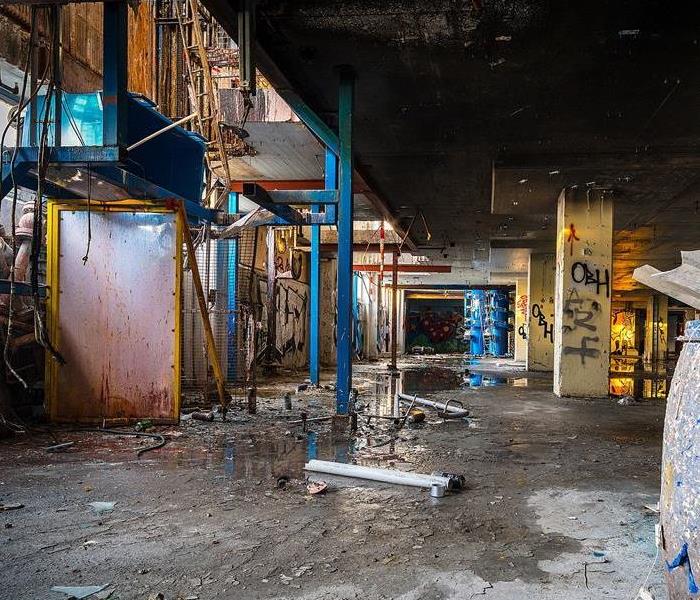 Water damage in warehouse.
Water damage in warehouse.
Wastewater is any water that has been affected by human use. But did you know that there are different grades of wastewater? Should your home be affected by water damage, it is imperative to act quickly to mitigate damage and prevent further damage such as mold growth.
CLEAN WATER
Floodwater that does not pose an immediate health threat is known as clean water. Clean water floods can result from malfunctioning appliances, toilet holding tanks, and melting snow and rainwater. Clean water home floods are generally safe for you to clean up yourself, but remember--time is an important factor. Standing clean water can become greywater if left untreated.
GREYWATER
Greywater refers to wastewater that is not contaminated with fecal matter. As far as household wastewater goes, greywater could include water from bathtubs and showers, appliances such as dishwashers, a weather event, an overflowing plumbing fixture or appliance, or even a broken pipe.
When flooding occurs, it can saturate carpeting, furniture, and drywall. If you experience a home flood with greywater, wear protective gear, and keep children and pets away from the flooded area. If the flood is extensive, such as several inches of water in the basement, it is advisable to hire professionals to safely clean up and decontaminate the area. Cleanup must begin as soon as possible as greywater can become blackwater if left untreated.
BLACKWATER
Blackwater is wastewater contaminated with human waste, floodwater, or water contaminated with chemicals.
Blackwater floods are the most dangerous and the most destructive and must be cleaned and mitigated immediately. Because of the unsanitary conditions of the water, items such as carpets, upholstery, and drywall are often unsalvageable. Contact with blackwater can cause illness in both humans and pets.
Having water damage in your home is never a pleasant experience, and oftentimes it is destructive, and disruptive - affecting multiple rooms, floors, levels – of a home, office, or multiple dwelling. Knowing whom to call and when could mean all the difference in keeping contamination and damage to a minimum.
Remember that you can call SERVPRO of Jersey City North/The Heights twenty-four hours a day, 365 days a year. We will be there to survey and clean up your water damage quickly and get you back to your normal routine as quickly as possible.
Leaking Hot Water Heater?
1/31/2022 (Permalink)
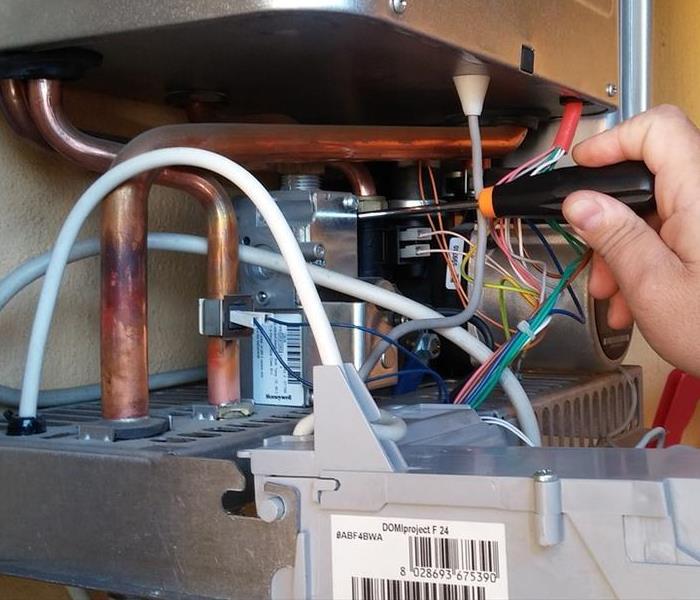 Maintenance being performed on a hot water heater.
Maintenance being performed on a hot water heater.
Sooner or later everyone will experience a leaking hot water heater. But this minor emergency doesn’t have to become a major disaster.
Here’s a list of steps you can take to minimize the damage from a leaking heater:
Confirm that it is, in fact, your water heater that’s leaking.
Sometimes looks can be deceiving. If you see a puddle of water under your hot water heater, it’s obvious why your first thought would be a heater leak. But that may, in fact, not be the problem.
If it’s a small puddle, your first step should be to clean up the water and inspect the heater. Do you see any wet fittings or other signs of leakage from the tank itself? Check your surroundings for other water sources? Maybe there’s a nearby window or pipe that is the actual source of the water you see. Don’t forget about the effect of gravity! If your floor slopes, the water may have traveled from a different source point to the place where it ultimately pooled.
Turn off the water.
If you do have a leaking water heater, the next recommended step is to turn off the water.
Your hot water heater should have its own shut-off valve.
If your valve is broken, you may need to shut off the water to your home. If you need assistance, reach out to your local expert professionals.
Cut the power.
Whether you have a gas or electrically powered water heater, your next step is to shut off the fuel source that powers your heater.
A gas tank should have its own dedicated shut-off gas valve. You want to make sure the gas is off so your heater will be safe to work with. If you have an electric tank, you can shut off the power at the breaker.
Try to determine the location and cause of the leak.
Now that the water and power are off, you will be in a better position to assess your situation and try to determine the location and course of your leak:
Check the pipes that connect to your heater for any loose fittings. This may just require quick tightening with a wrench.
- Check your pressure relief valve. If the temperature or pressure is too high, this could be causing valve leaks. Your water heater should be around 120 degrees Fahrenheit and the pressure shouldn’t be over 80 PSI.
- Check the drain valve to make sure it doesn’t need replacing.
- Check the bottom of the water heater itself -- it may be that the tank itself is cracked and needs to be replaced.
If you determine that it is your tank that is leaking and the leak is serious, you may want to drain the tank to minimize further water damage.
Hopefully, the leak from your hot water heater hasn’t caused too much water damage. But if you need professional assistance, the restoration pros at SERVPRO of Jersey City North/The Heights are here to help. We’re equipped to handle any size water damage restoration needed for either residential or commercial buildings.
Cleaning a Flooded Basement
1/31/2022 (Permalink)
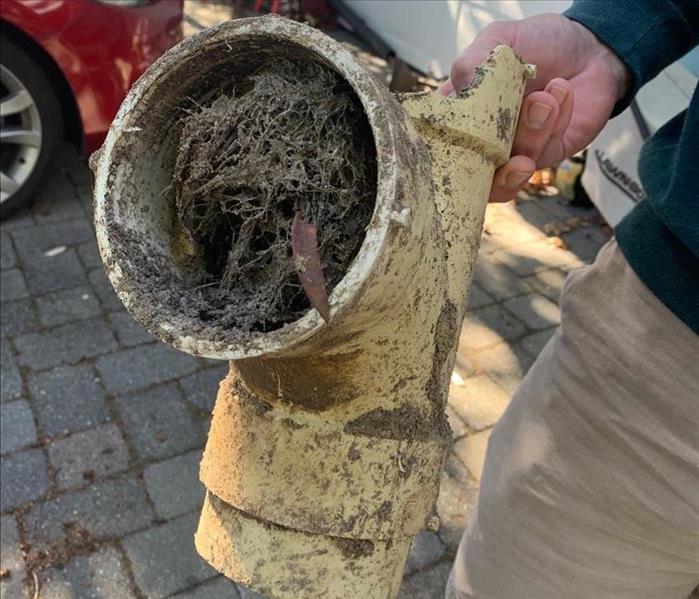 The roots of this tree penetrated and clogged a sewer line causing it to back up into a basement.
The roots of this tree penetrated and clogged a sewer line causing it to back up into a basement.
Groundwater flooding is basically water in your basement caused by seepage or flows through the walls or foundation floor.
According to State Farm Insurance, there are four common sources of water entering basements. Each source has its own specifics and requires its own course of action.
Surface water running down foundation walls.
If this is the first instance of water problems in your basement, the first thing to check for is surface water draining down next to the foundations. Water coming in at one location or only at the exterior foundation wall indicates surface water problems. Here are some things to look for once you get outside.
- Overflowing gutters: leaves
- Overflowing gutters: downspouts
- Downspout distance
- Pavement slope
- Sealant
- Landscape slope
- Irrigation
Groundwater in water-saturated soils is being pushed into the basement by hydrostatic pressure.
If no surface water sources are found, then the source of the water is likely subsurface groundwater under hydrostatic pressure. When the groundwater levels outside the basement rise above the level of the floor, the basement acts like a boat in a pond. If a boat is sitting in water, water will leak in through any open cracks or holes. It works the same way with a basement. Hydrostatic pressure can push water through hairline cracks.
Unfortunately, subsurface groundwater problems are more difficult and more expensive to fix than surface groundwater problems.
Storm sewer water from the municipal storm sewer system backing up into the home's existing perimeter foundation drain and leaking into the basement.
If you have an older house within town and the house has a basement with no sump pump, it is likely the perimeter foundation drain system connects directly into the city storm sewer system. If the level of the basement is below the street level, there is the potential of stormwater backing up in the city storm sewer system and being pushed into the perimeter foundation drain system. This can saturate the soils around the house at the basement level with stormwater under hydrostatic pressure, causing water to leak in.
- Underground springs
- Stormwater backing up
- Sewer water backing up
Sanitary sewer water from a clog in your home's sewer line. If there is a clog in the municipal sewer line, or the combined municipal storm/sanitary sewer system backing up into the home's drain system, it can cause sewer water to come up through sink drains and floor drains on lower levels.
Whatever the cause of water in your basement, remember it is important to have it dried out as soon as possible by a professional. SERVPRO of Eatontown/Long Branch is available 24/7 and will be able to get to your water damage quickly.




 24/7 Emergency Service
24/7 Emergency Service






